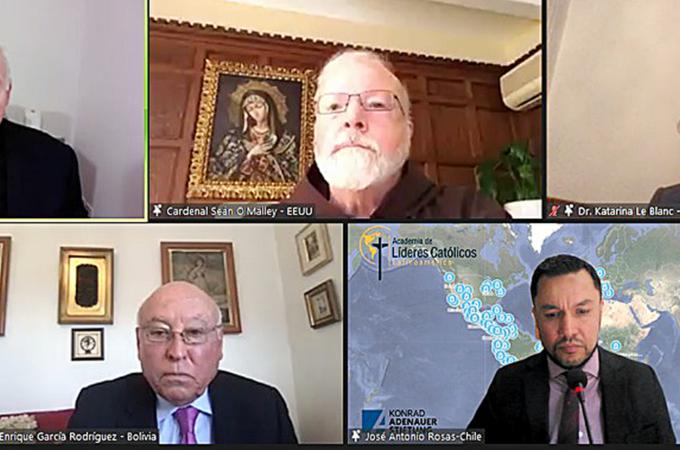From Cardinal Seán's blog
On Martin Luther King Jr. Day, ordinarily, I would have gone to St. Katharine Drexel Parish for their annual Prayer Breakfast to celebrate Dr. King's legacy. This year, however, I was happy to join them online for their virtual celebration, which was hosted by the pastor, Father Oscar Pratt.
There were a small number of people at the parish itself though many more joined us via Zoom.
The program featured several readings from Dr. King's works, accompanied by powerful images, as well as a performance by Boston's three Black Catholic tenors: Meyer Chambers, Fred Van Ness, and Byron Wratree.
The keynote speaker for this year's celebration was Rev. June Cooper, executive director of Boston City Mission. She earned degrees from Newton College of the Sacred Heart and the Boston College School of Social Work before she went to the Protestant seminary, so she is very familiar with the Catholic Church. She gave a beautiful reflection on the meaning of Dr. Martin Luther King's message for us today, and I enjoyed it very much.
International conference
On Tuesday, I addressed an international conference on the distribution of coronavirus vaccines in Latin America. I had been approached by Dr. Enrique Segura, a board member of The Catholic University of America, with the invitation by Cardinal Aguiar of Mexico City and Jose Antonio Rosas of the Academia de Lideres Catolicos de Latinoamerica (The Latin American Academy of Catholic Leaders), who were holding this conference.
There were three speakers during the day, followed by a period of questions and answers.
I was asked to give a talk on the ethical aspects of the coronavirus vaccines -- why we can and should be vaccinated.
Dr. Katarina Le Blanc, an immunologist from Switzerland who is a member of the Pontifical Academy of Sciences, gave a very interesting talk on the scientific background of the vaccines. We also heard from Enrique Garcia Rodriguez, the former treasurer of the Inter-American Development Bank. He talked about the impact of the pandemic on the world economy, and particularly in Latin America, which is the area that has suffered the most economically because of the pandemic.
Second dose of coronavirus vaccine
On Thursday, I went to St. Elizabeth's Medical Center to receive my second dose of the coronavirus vaccine. Dr. Joseph Weinstein, chief physician of the Steward Health Care Network, has been of great help to the archdiocese and the community at large in leading a response to the COVID public health crisis. We are blessed by his dedication to caring for others.
While I was at St. Elizabeth's, I was pleased to be able to celebrate Mass in the hospital chapel, which was broadcast to all the hospital rooms through their closed-circuit television system.
Health care has always been a very important ministry in the Church since the time of Christ, who devoted so much time to care for the sick. In the day's Gospel, there were three mentions of the great crowds seeking out Jesus, and they were about people taking their sick to him for healing. In my homily, I talked about how that ministry continues today through Catholic health care, and I noted that about one-quarter of the hospitals in the world -- and over 60 percent in the developing world -- are run by the Catholic Church.
I also spoke about the history of Catholic health care in the archdiocese and how the Sisters who originally founded St. Elizabeth's Medical Center were Third Order Franciscan Sisters.
St. Elizabeth is the patroness of the Third Order of St. Francis. She was the queen of Hungary and used all of her wealth to serve the poor and became a Third Order Franciscan herself.
We are very grateful for the ministry that takes place in our hospitals, and during the Mass we prayed especially for the victims of the coronavirus and their loved ones. We prayed also for the first responders, medical personnel and those working in our hospitals to care for the sick.



















